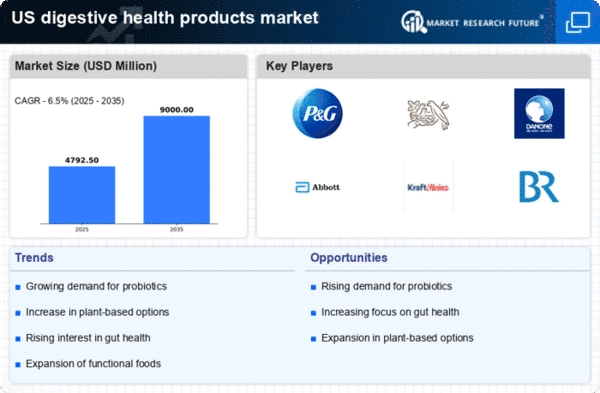Aging Population
The demographic shift towards an older population in the US will likely have a profound impact on the digestive health-products market. As individuals age, they often experience various digestive issues, such as constipation, bloating, and irritable bowel syndrome. This demographic trend indicates a growing need for products that address these concerns. Reports indicate that the population aged 65 and older is projected to reach 80 million by 2040, which could significantly increase the demand for digestive health solutions. Consequently, companies in the digestive health-products market may focus on developing targeted products that cater specifically to the needs of older adults, thereby capitalizing on this expanding consumer base. The intersection of aging and digestive health will create new opportunities for innovation and product development.
Increasing Health Awareness
The growing awareness of health and wellness among consumers is a primary driver for the digestive health-products market. As individuals become more informed about the importance of gut health, they are increasingly seeking products that promote digestive well-being. This trend is reflected in the rising sales of digestive health supplements, reaching approximately $3 billion in the US in 2023. Consumers are now more inclined to invest in products that support their digestive systems, leading to a surge in demand for probiotics, prebiotics, and digestive enzymes. This heightened focus on health is likely to continue influencing purchasing decisions, thereby propelling the growth of the digestive health-products market. Furthermore, educational campaigns by health organizations may further enhance consumer knowledge, potentially expanding the market even more.
Rise of Clean Label Products
The trend for clean label products is becoming increasingly relevant in the digestive health-products market. Consumers are now more discerning about the ingredients in their food and supplements, often preferring products that are free from artificial additives and preservatives. This shift is indicative of a broader movement for transparency and sustainability in food production. According to recent surveys, approximately 70% of consumers in the US prefer products with simple, recognizable ingredients. As a result, manufacturers are likely to reformulate their digestive health products to align with these consumer preferences, potentially enhancing their market appeal. This emphasis on clean labels may not only drive sales but also foster brand loyalty among health-conscious consumers, thereby shaping the future landscape of the digestive health-products market.
Growing Interest in Natural Remedies
The increasing preference for natural remedies is a significant driver in the digestive health-products market. Many consumers are shifting away from synthetic medications and seeking natural alternatives to manage digestive issues. This trend is supported by a growing body of research showing the efficacy of natural ingredients, such as herbal extracts and plant-based probiotics, in promoting digestive health. Reports indicate that the market for herbal supplements in the US is growing steadily at a rate of around 8% annually. This inclination towards natural solutions may encourage manufacturers to explore and develop products that harness the power of nature, thereby appealing to health-conscious consumers. As the demand for natural remedies continues to rise, it is likely to shape the product offerings within the digestive health-products market.
Technological Advancements in Product Development
Technological innovations are playing a crucial role in shaping the digestive health-products market. Advances in food science and biotechnology are enabling the development of more effective and targeted digestive health solutions. For instance, the use of fermentation technology has led to the creation of novel probiotic strains that offer enhanced health benefits. Additionally, the integration of digital health technologies, such as mobile applications for tracking digestive health, is becoming more prevalent. These advancements may facilitate personalized nutrition solutions, allowing consumers to tailor their digestive health regimens to their specific needs. As technology continues to evolve, it will likely drive innovation within the digestive health-products market, potentially leading to the introduction of new products that meet the demands of a tech-savvy consumer base.
















